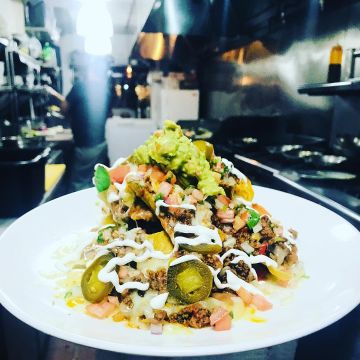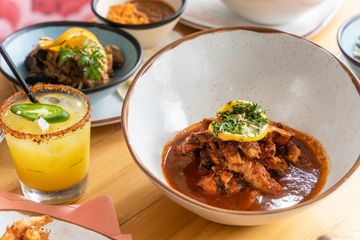Is Mexican Food Healthy And Balanced? Unboxing the Nutritional Advantages of Traditional Components
The question of whether Mexican food is healthy and balanced invites an expedition of its standard active ingredients. Beans and corn work as foundational staples, abundant in protein and fiber. Avocados offer advantageous fats, while numerous herbs and seasonings add taste and health and wellness advantages - hand crafted margarita. With each other, these elements develop a tapestry of nutrition. Nevertheless, the healthiness of Mexican food commonly depends on prep work approaches and portion dimensions. What duty do these elements play in determining its total dietary value?
The Power of Beans: Protein and Fiber-Rich Staples
Although often forgotten, beans act as a cornerstone of Mexican cuisine, using a wealth of nutritional benefits. Rich in protein, they are an exceptional plant-based choice for those looking for to satisfy their dietary healthy protein requires. This high healthy protein content supports muscle mass repair and development, making beans very useful for both vegetarians and meat-eaters alike. Furthermore, beans are an exceptional source of nutritional fiber, which aids in digestion and advertises a sensation of volume, potentially aiding with weight monitoring.
The selection of beans made use of in Mexican recipes, such as black beans, pinto beans, and kidney beans, contributes to a varied flavor profile and can improve meals nutritionally. Beans are reduced in fat and have crucial vitamins and minerals, consisting of iron, folate, and magnesium. Together, these attributes make beans an important component, delivering both sustenance and nutrition in standard Mexican price.

Corn: a Versatile Grain With Nutritional Conveniences
Corn stands apart as a versatile grain basic to Mexican cuisine, commemorated not only for its culinary applications yet likewise for its remarkable dietary account. As a primary active ingredient in dishes like tortillas, tamales, and pozole, corn supplies important nutrients that add to a well balanced diet plan. Rich in carbs, it works as a considerable power source, while also being low in fat, making it a favorable choice for numerous dietary requirements.
Corn is a great resource of dietary fiber, which aids in digestion and advertises satiation. It contains considerable quantities of vitamins such as B-complex vitamins, which are vital for basal metabolism. The presence of antioxidants, especially carotenoids, adds to overall wellness by lowering oxidative anxiety. In addition, corn is gluten-free, dealing with those with gluten sensitivities. Overall, the dietary advantages of corn highlight its value in typical Mexican food and its duty in a healthy and balanced diet.
Avocados: Healthy Fats and Nutrients in Every Bite
Avocados play a substantial duty in Mexican food, enhancing recipes with their luscious appearance and abundant flavor. Beyond their culinary allure, avocados are celebrated for their remarkable dietary profile. They are a rich source of healthy monounsaturated fats, which can aid reduced negative cholesterol degrees and assistance heart health and wellness. Furthermore, avocados are packed with vital minerals and vitamins, including potassium, vitamin E, and B vitamins, contributing to overall wellness.
The high fiber material in avocados aids food digestion and advertises satiation, making them a helpful enhancement to any type of dish. Their unique nutrient make-up can likewise support skin health and provide anti-inflammatory advantages. Integrating avocados into typical Mexican dishes or enjoying them as a standalone treat can improve both flavor and nourishment, showing why they are a cherished staple in Mexican cuisine. Generally, avocados use a scrumptious method to delight in healthy fats and essential nutrients in every bite.

Spices and Natural Herbs: Flavorful Wellness Boosters
While delighting in the abundant flavors of Mexican cuisine, one can not overlook the essential duty that spices and herbs play in improving both preference and health. Components such as oregano, chili, and cilantro peppers not just add to the vibrant flavor account yet also supply substantial health advantages. Cilantro is recognized for its detoxifying residential properties, aiding to remove heavy steels from the body, while oregano is loaded with antioxidants and possesses anti-inflammatory results.
Chili peppers, a staple in several Mexican recipes, include capsaicin, which has been linked to enhanced metabolic process and pain alleviation. Additionally, flavors like cumin and coriander support digestion and may aid in blood glucose indian food guideline. Integrating these flavorful health and wellness boosters right into dishes not only improves the culinary experience but also advertises total health, making Mexican food not simply tasty, however likewise nutritionally beneficial.
Traditional Food Preparation Techniques: Enhancing Nutrition and Flavor
Typical food preparation techniques in Mexican cuisine play a crucial duty in improving both nutrition and flavor, as they often focus on classic methods and fresh ingredients. Techniques such as nixtamalization, where corn is saturated and prepared in an alkaline service, not only boost the nutrient account of tortillas however also boost their digestibility - happy hour. Additionally, making use of slow food preparation methods, like cooking or braising, enables tastes to blend perfectly while preserving the stability of the ingredients
Often Asked Concerns
Are Mexican Food Portions Usually Larger Than Various Other Foods?
Mexican food parts are frequently larger than those of several various other cuisines. This particular shows traditional dining techniques, highlighting communal sharing and hearty dishes, which can cause an extra significant offering dimension generally.
Just how Does the Prep Work Method Affect Healthfulness of Mexican Food?
Preparation methods greatly affect the healthiness of Mexican food. Strategies my blog such as barbecuing or steaming preserve nutrients, while frying can raise undesirable fat web content. Options of ingredients and cooking designs eventually identify total nutritional worth.
Can Mexican Food Be Tailored for Certain Dietary Limitations?
Mexican food can undoubtedly be tailored for certain nutritional limitations. Replacements, such as utilizing corn tortillas for gluten-free diets or integrating even more vegetables, make it possible for individuals to appreciate conventional flavors while accommodating different dietary needs.
What Prevail False Impressions About Mexican Food and Health?
Typical misconceptions regarding Mexican food consist of the belief that it is inherently undesirable, excessively zesty, and entirely concentrated on fats. Actually, conventional meals often feature healthy active ingredients and can be tailored to numerous nutritional needs.
Are There Healthier Choices at Mexican Dining Establishments?
Much healthier alternatives at Mexican restaurants often include barbequed meats, beans, and fresh vegetables. Selecting meals that stress entire active ingredients and avoiding heavy sauces can lead to a more healthy eating experience, advertising general wellness.
The range of beans made use of in Mexican recipes, such as black beans, pinto beans, and kidney beans, adds to a varied taste account and can improve meals nutritionally. Avocados play a substantial duty in Mexican food, complementing dishes with their creamy texture and abundant taste. Including avocados right into standard Mexican recipes or appreciating them as a standalone snack can boost both flavor and nutrition, demonstrating why they are a beloved staple in Mexican food. While enjoying the rich tastes of Mexican food, one can not forget the essential duty that spices and herbs play in boosting both taste and health and wellness. Standard food his explanation preparation methods in Mexican cuisine play an important function in enhancing both nutrition and taste, as they usually focus on fresh components and time-honored techniques.